Burglaries on and around campus have almost doubled in the
past year, amid rising crime rates in other areas such as motor vehicle theft,
narcotics arrests and alcohol offenses, according to the annual campus crime
report.
The Clery Campus Security Report is a collection of
statistics relating to crime at UCSD and its surrounding areas. Although last
year’s Clery report showed less reported crimes overall, the trend has reversed in several major areas this
year.
In 2006, the UCSD Police Department, San Diego Police
Department, campus security authorities and the UCSD Medical Center reported
113 burglaries, almost doubling after reaching a low point of 56 in 2005. These
agencies also reported that motor vehicle theft increased from 102 in 2005 to
152 in 2006, and that five arson cases occurred in 2006, compared to one in
2005. Reported sex offenses decreased from six in 2005 to two in 2006, while
aggravated assault remained steady at seven for both years.
However, the number of these crimes that physically occurred
on campus indicates a downward trend in certain areas. Aggravated assaults
decreased from seven in 2005 to two in 2006, and reported on-campus sex
offenses also decreased from five in 2005 to one in 2006. The number of
reported burglaries still shows a significant upsurge, moving from 52 in 2005
to 91 in 2006, but the increase in on-campus motor vehicle thefts was not as
steep, with 64 thefts reported in 2005 compared to 73 in 2006 — an increase of
only nine on campus compared to 50 in the UCSD area.
Campus security authorities, including the UCPD as well as
various staff and resident advisers, also gave out more on-campus alcohol-related
disciplinary referrals — jumping from 1,193 in 2005 to 1,380 last year.
Drug referrals reported by campus security authorities
increased slightly from 96 in 2005 to 104 in 2006. UCPD also made 34 arrests
for drug or narcotics offenses, six arrests for weapons offenses and 30 arrests
for alcohol offenses on campus last year.
According to UCPD Lt. David Rose, the crime statistics
gathered in the report do not directly dictate the department’s activities,
since they strive to curtail problems as they occur.
“Typically, the Clery is more a summary of activity,” Rose
said. “The statistics in the Clery report are tracked throughout the year, so
for instance, if we notice an increase in auto thefts or bike thefts or issues
surrounding alcohol, we’re usually aware of it in very short order and we’ll
take steps to address it.”
Rose added that the Clery report mainly influences the
department in terms of public perception — should the public perceive that
areas on campus were unsafe, for example, the department would usually hold
workshops or public meetings to increase awareness of the issue.
“We work with the City of San Diego and get statistics from
them too, so we’re trying to be proactive,” he said. “That’s not to say we can
prevent everything, but if those statistics jump out at you, they jumped out at
us a long time ago.”
The report is required under the Jeanne Clery Disclosure of
Campus Security Policy and Campus Crime Statistics Act, a federal law signed in
1990 that applies to all universities participating in federal financial aid
programs.
The legislation is enforced by the U.S. Department of
Education, and gross violations of the law could cause a university to lose all
federal financial aid.
The act mandates that Clery reports include statistics for
crimes reported on and near college campuses for the last three years, as well
as descriptions of police department policies, crime-prevention programs and
investigation procedures for reported sex offenses. It also requires the police
departments to issue “timely warnings” about ongoing crimes in the community
and to keep a daily campus crime log that is open to the public.






